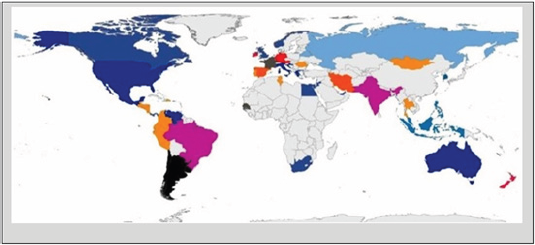- Submissions

Full Text
Novel Research in Sciences
Science Popularization in the Era of the Zoom’s and the Social Media
Dan Ophir*
Ariel University, Computer Science Department, Ariel, Israel
*Corresponding author: Dan Ophir, Ariel University, Computer Science Department, Ariel, Israel
Submission: September 06, 2021;Published: September 23, 2021
.jpg)
Volume9 Issue3September, 2021
Opinion
The corona virus that has invaded the world for the past year and a half has created the need for many adjustments to the new and complex reality that has been imposed on all of us: a reality that includes closures, social disconnections, economic crises, business challenges, and an almost complete dependence on remote connections. The prolonged stay at home due to the closures and the crisis in the employment market has led many people to spend many hours in front of a computer screen. In doing so, the corona crisis, which has negatively affected the entire world, has been challenged by the social networks, which have been an integral part of our lives in recent years; they have long been used not only for creating and maintaining social connections mainly for entertainment. Currently the most popular global social networks are Facebook. LinkedIn [2], Instagram, Pinterest, Vine, Tumblr, and Twitter. In the past, My Space was also popular. Some online social networks are especially popular in a particular region or country, such as Qzone in China, VK and Odnoklassniki.ru in Russia, tagged in Spain, Orkut in Brazil and India, and in the past, the “guys” and “linked” sites in Israel (Figure 1). Along with the development of social networks, the outbreak of the corona plague around the world has also led to a very significant increase in the volume of the use of the Zoom application software.. Following the closure of campuses, universities, the cessation of cultural and artistic events, as well as in museums, clubs, and libraries, there has been a huge increase in the daily use of Zoom among many users, including private organizations, in order to keep in touch with different audiences and make lectures, presentations, tutorials, and virtual tours more accessible to anyone with the appropriate computer set-up and internet access.
Figure 1:The world map of the main social networks  facebook
facebook  bebo . For a website showing the current number of members in
facebook.
bebo . For a website showing the current number of members in
facebook.

In other words, the new reality that has been imposed on all of us and the need to find solutions to the many challenges and difficulties created by the Corona crisis has caused us all, whether knowingly or not, to use social networks and Zoom as the primary tools to deal with these difficulties. One can complain about the age of screens and social networks, but one should recall what happened during the 1918 influenza pandemic (the Spanish flu) in which 50 million people died worldwide. It involved seclusion for extended periods, with or without family and without social networks, computers, and a supportive environment (even at a distance). This differed from today’s Covid-19 pandemic, regarding the positive aspects of today’s technological advances in coping with the crisis. On a personal level, I must admit that the corona pandemic caught me unprepared as well. I am a senior lecturer and researcher in the fields of computer science and mathematics at Ariel University. I hold a PhD from the Weizmann Institute of Science. I have realized that the world has changed and that this change is here to stay. Thus, I have concluded that I will have to change accordingly. The fact that technology is “flowing in my arteries” has played in my favor. I set myself the goal of taking advantage of the new reality. This includes understanding the technological developments that enable it and the subsequent changes in society’s behavioral habits in order to utilize the vast knowledge and experience I have accumulated over the years. Thus, I intend to utilize the new technology to make science accessible to the general public through diverse and inspiring lectures on various scientific topics and their interface with art, culture, and what lies between them. My initiative is called “The Popularization of Science”. Social networks and applications such as Zoom have served as a critical support platform for establishing it and have played a crucial role in its success. They are the subject of this article and serve as a schematic model for others to present their topic in a series of lectures.
© 2021 Dan Ophir. This is an open access article distributed under the terms of the Creative Commons Attribution License , which permits unrestricted use, distribution, and build upon your work non-commercially.
 a Creative Commons Attribution 4.0 International License. Based on a work at www.crimsonpublishers.com.
Best viewed in
a Creative Commons Attribution 4.0 International License. Based on a work at www.crimsonpublishers.com.
Best viewed in 







.jpg)






























 Editorial Board Registrations
Editorial Board Registrations Submit your Article
Submit your Article Refer a Friend
Refer a Friend Advertise With Us
Advertise With Us
.jpg)






.jpg)














.bmp)
.jpg)
.png)
.jpg)










.jpg)






.png)

.png)



.png)






